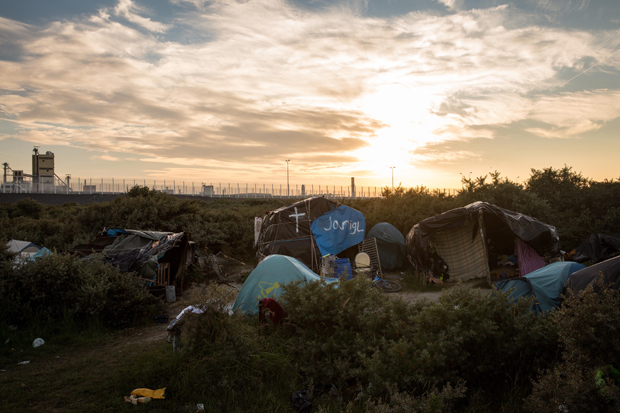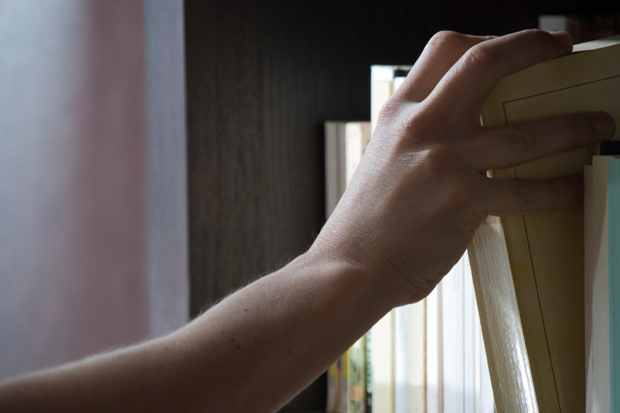Sikander and I are sitting at a small table in a small shed. The shed is filled floor-to-ceiling with books: chick lit, thrillers and a neat set of Agatha Christies line the shelves, alongside a large atlas, a few dictionaries and grammars, and the thin green spines of children’s learning-to-read books. More books spill out of boxes stacked in the corner, and pens, notepads, bags of clothes, a globe, a guitar and a game of Battleships are useful flotsam. We are in Jungle Books, a library which British volunteer Mary Jones set up a few weeks ago in the Calais migrant camp known as ‘The Jungle’.
Sikander, a lean Afghan, tells me that the last book he took out was about starting a small business. He tells me about the restaurant he has set up in the camp and the new one he is planning. He is fizzing with energy and ideas, such as introducing vouchers which people who want to help can buy and give to those in need. Sikander segues from plans for his restaurant to plans for the library — the extension they will build, the films they will screen, the discussions they will host. Some 50 of the camp’s 3,000 or so migrants are regulars at the Jungle Books but Sikander is sure more will come if there’s space to sit and browse. ‘I’m just helping Mary,’ he says, when I ask how he is involved, ‘Of course I have to help her, just as she helps us.’
While we’ve been talking, a young Sudanese man called Babiker has been engrossed in a novel by Jean Plaidy. He asks a volunteer, ‘Can I take it with me?’ There is no issuing system, no dates stamped on the front page, and happy assents meet any requests to take books out. The volunteer, Bill, tells Babiker that reading Jean Plaidy when he was younger sparked an interest in history. For Babiker, Jean Plaidy represents his dream of reading English books in England. He would like to study in the UK and asks me, ‘Is it expensive?’
Tuition fees don’t feature in Plaidy’s books, and I watch Babiker’s face close with disappointment as I try to explain them. Mohammed, who has been hovering nearby, joins our conversation. ‘So it is impossible for us,’ he says flatly. Mohammed was studying maths and physics in Sudan and talks about how much he would like to join the physics community in France. The last book he read here was a history of Sudan, and he wishes the library had books about Linux programming.
When Mohammed says he would also like there to be a laptop so he could access the internet, I laugh and tell him the same thing is happening in the UK: people increasingly go to libraries to get on the internet rather than for a book. At Jungle Books, Mary is responding to demand; she has managed to source a few laptops and is getting a generator and 4G router to provide Wi-Fi.
Internet access is just one of Mary’s many plans for the library, for while Jungle Books is a space for books, it is above all a space for people. She tells me, ‘Ask anyone here what they want and they tell you they want a normal life. This library can lend a semblance of normality to their lives. It’s a place where people can drop in and have a chat, maybe play a bit of music, not only read books.’
A man called Abraham picks up a guitar and gently picks out a tune, explaining to me that the instrument he played in Sudan was similar but had just one string and a smaller body. The strum of the guitar, the rustle of turning pages, and the soft hum of conversation make the library a peaceful respite from the hot tumult of the camp. I’m told that more instruments are coming and they are hoping to start music lessons before long.
There are already daily French lessons. Before picking up the guitar, Abraham was hunched over a French schoolbook while Mohammed helped with his pronunciation of vowels. ‘I want to speak French so I can stay in France,’ Abraham says. When I ask him what books he would like to have in the library, he lists: French-Arabic dictionaries, French vocab books, French grammar books, and short books in French. This Francophilia seems to be a sentiment shared by many; according to Sikander, when people come to the library and see there aren’t many French books, they tend to go away again.
Most of the men who come to the library speak little English. I am taken aback when a man who has been flicking through various novels for at least half an hour, including classics like Steinbeck’s Of Mice and Men, settles on a thin picture book about kittens. When I ask him if he really likes cats, he shrugs, mumbles a thank you, and leaves. Once I see he has barely enough English to say thanks, I can see why he hasn’t gone for Steinbeck, but the fact that he’s spent so long looking at books he can’t yet read speaks volumes about his hope — hope for a time when he will be able to read them all. Books are at their most potent here; each volume feels heavy with hope for a better time to come. The books here don’t just mean stories and information, they represent dreams, and people here need to dream.
The future, at least of Jungle Books itself, is bright. People have volunteered to build an extension — more space for teaching, distributing clothes, and discussions. Sikander is especially enthusiastic about the latter: ‘We are all from different countries, but if we can all sit together, we can understand each other, learn from each other and make friendships. That way we will finish a lot of problems in the Jungle.’ He says he would like a space where one evening he could give a talk about the history of Afghanistan and then, another time, listen to someone talking about the problems in Eritrea or Syria. He points out the need for migrants to realise they all share the same problems. ‘This talk I would give is like my book.’ He gestures towards Mohammed: ‘Like the history of Sudan is his book. I just need to get people to listen.’
Got something to add? Join the discussion and comment below.
Get 10 issues for just $10
Subscribe to The Spectator Australia today for the next 10 magazine issues, plus full online access, for just $10.
For more information about Jungle Books, including how to donate, see spectator.co.uk/junglebooks
You might disagree with half of it, but you’ll enjoy reading all of it. Try your first month for free, then just $2 a week for the remainder of your first year.















Comments
Don't miss out
Join the conversation with other Spectator Australia readers. Subscribe to leave a comment.
SUBSCRIBEAlready a subscriber? Log in